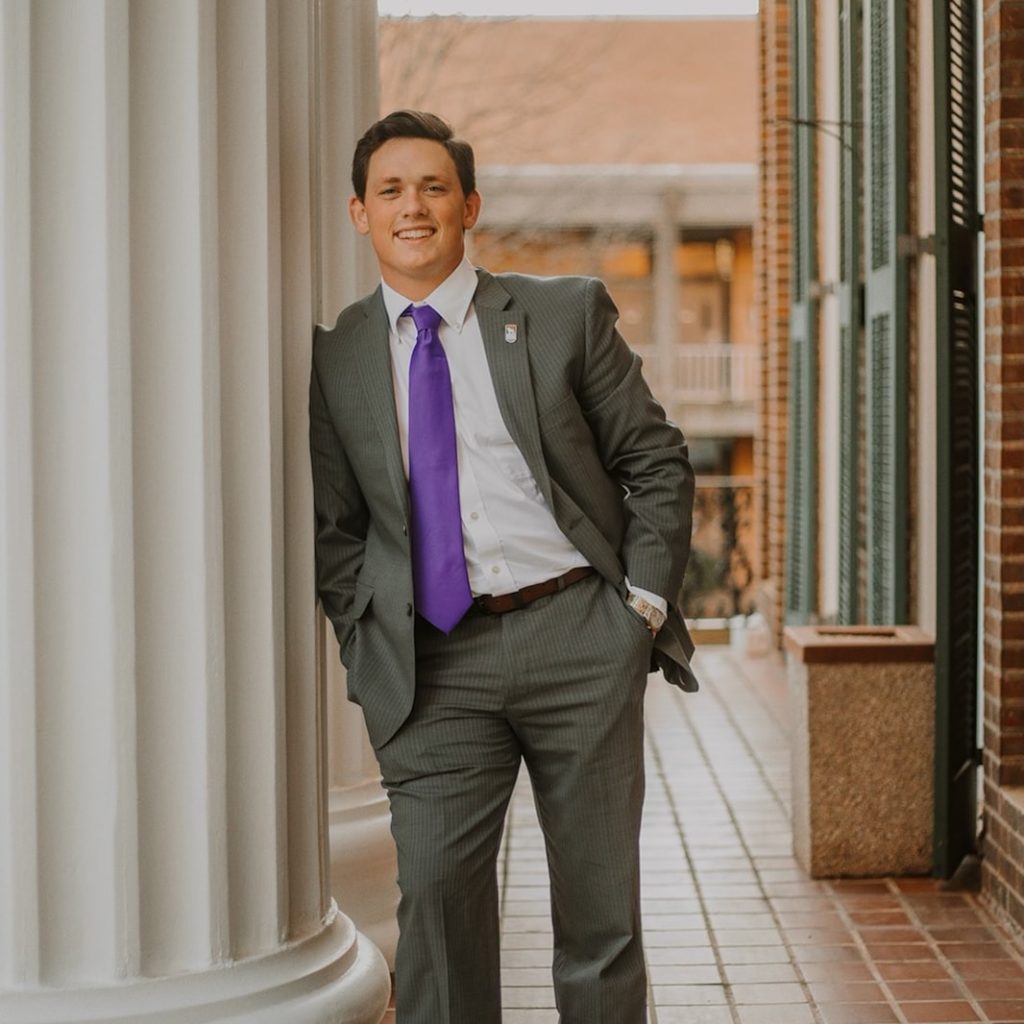Alabama House GOP Caucus passes resolution supporting UNA Student Government President

University of North Alabama Student Government President Jake Statom gained recent support from the Alabama House Republican Caucus following student-led efforts to demand his resignation. Political pressure unsued following Statom’s repost of an Instagram post on his personal social media account about the “LGBTQ” agenda, adding a statement that sought to promote traditional morals and biblical values. Student activists responded to this by crafting a petition demanding his resignation from the student government presidency by June 30 and threatening impeachment proceedings if he failed to concede to their demands. Following this, Statom released a video apologizing to those who might have been hurt by his online comment and committing to being more thoughtful and considerate of differing perspectives, according to a recent press release from the Alabama House Republican Caucus. “My Republican colleagues and I recognize the courage it takes for college leaders to promote biblical principles and traditional values on campuses that are increasingly embracing the Cancel Culture and its ‘woke’ demands,” State Rep. Jamie Kiel said. “Because our founding fathers considered the freedoms of speech and religion so important, they made them the First Amendment of the Bill of Rights, and Jake Statom was simply exercising the liberties that are guaranteed to him.” Kiel sponsored a resolution in support of the student leader with House Republican Caucus members from across the state voting its approval. Other members of the local legislative delegation including State Reps. Lynn Greer (R – Rogersville), Phillip Pettus (R – Killen), Andrew Sorrell (R – Muscle Shoals) and State Sens. Larry Stutts (R – Tuscumbia) and Tim Melson (R – Florence) have also expressed strong support for Statom, according to Kiel. “Whether someone agrees with or opposes the stand that Jake Statom has taken, his constitutional right to speak freely and promote his religious beliefs must not be abridged with threats of impeachment and baseless attacks on his character,” Senator Stutts added. The text of the House Republican Caucus resolution reads: WHEREAS Jake Statom, an engineering major from Tuscumbia, was elected as president of the University of North Alabama Student Government Association in February; and, WHEREAS Statom reposted an Instagram post about the “LGBTQ” agenda and added a statement that sought to promote traditional morals and biblical values; and, WHEREAS some students responded to Statom’s comment, which was made on his personal social media account, with a petition demanding his resignation from the student government presidency by June 30 and threatening impeachment proceedings if he did not concede to their demands; and, WHEREAS Statom released a video statement apologizing to those who might have been hurt by his online comment and committing to being more thoughtful and considerate of differing perspectives; and, WHEREAS a student-led counter petition supporting Statom’s right to free speech and expression garnered more signatures than the one that issued threats of political reprisals; and, WHEREAS the university environment is traditionally one which promotes the free and open exchange of ideas – both conservative and liberal – and protects an individual’s right to their own religious beliefs, values, and moral standards; and, WHEREAS the dangerous “Cancel Culture” atmosphere that predominates on college campuses both in Alabama and across the country seeks to silence opinions that are deemed to be politically unacceptable to leftist ideologues and punish those who continue to adhere to traditional values, especially those rooted in fundamental religious teachings; and, WHEREAS, Statom committed no impeachable offense by simply exercising the basic freedoms of opinion, expression, and religion that are guaranteed to all Americans under the Bill of Rights of the U.S. Constitution; now, therefore, BE IT RESOLVED, that we, the members of the Alabama House Republican Caucus, support Jake Statom’s right to express and promote his personal beliefs in the public forum and recognize his voluntary willingness to apologize to those he might have offended; and, BE IT FURTHER RESOLVED, that we strongly oppose any effort to impeach, remove, or apply political pressure intended to force Jake Statom from the presidency of the University of North Alabama Student Government Association. Given under our hand and the seal of the Alabama House Republican Caucus on this 30th day of June, 2021. House Majority Leader Nathaniel Ledbetter House Majority Caucus Vice-Chair Connie Rowe
Steve Flowers: Gambling and budgets priority for legislature

The legislature is at the midway point of the 2021 Regular Legislative Session. They have used 15 days of their allotted 30-day legislative session. The Senate has been consumed with attempting to pass a constitutional amendment to allow Alabamians the right to vote on whether to have a state lottery along with some casino and sports betting. The legislature in and of itself cannot authorize this expansion of gambling in the state. Their only authority is to vote to place it on the ballot in order to give you the opportunity to allow the state to reap the financial windfall now only afforded the Indian Gambling Syndicate. There was a critical vote in the state Senate last week on the issue. With it being a constitutional amendment, it required 21 votes. The vote was 19 to 13 in favor, but it lacked the constitutional muster by two votes. Therefore, the measure could be resurrected. However, if it is this close in the Senate, it probably does not have the votes for passage in the House of Representatives. Polls indicate that it would be approved by a vote of the people, probably with a 70 to 30 plurality, and with a majority of Republicans voting in favor. If it is that popular with the people, you probably are asking why in the world would Senators not vote to allow you to vote on it. The devil is in the details. The majority of the casinos would go to the Creek Indian Gambling Syndicate. Some of the 24 Republican Senators balked at that almost total monopoly. Senator Del Marsh was not the right sponsor or frontman for the constitutional amendment. He is not totally trusted, especially by the 10 Democrats he has consistently run over and ignored for years while he was President Pro Tem of the Senate. Marsh is also perceived as a pawn of the Indian Gambling Syndicate. He is no longer Pro Tem, so nobody is scared of him. A setting sun sets off very little heat. He is not running for reelection for his Anniston-based district because he could not be reelected. In his last race in 2018, he spent close to $480,000 to his unknown opponent’s $15,000 and only garnered 52% of the vote. That does not portend well for reelection. Governor Kay Ivey needs to come out openly and strongly for the measure and make it her issue and her legacy. It may need to be done in a Special Session later this year. Even then, it will be a tough sell to get through the Senate and then the House. Alabama is the Heart of the Bible Belt. If Alabama is the Bible Belt, then the area of Alabama, north of Birmingham and all the way to the Tennessee line, is the buckle. There are not any casinos in North Alabama, only churches, and most of the churchgoers are Church of Christ or Baptist. They did not allow the sale of alcohol in most of these counties until a few years ago. Every state senator in that area is a Republican, and all of them voted no, including Garlan Gudger of Cullman, Sam Givhan of Huntsville, Tom Butler of Huntsville, Larry Stutts of Florence, and Clay Scofield of Sand Mountain. You can probably bet your bottom dollar that the preachers encouraged their parishioners to contact their senators on Sunday before the vote last Tuesday. You may see the legislature address a simple lottery. It may not be a glamorous event in the legislative process, however, the beginning of the most important and imperative accomplishment occurred last week when the General Fund Budget passed the Alabama House of Representatives. The House approved a $2.4 billion dollar budget shepherded by the Ways and Means Chairman Steve Clouse (R-Ozark). The budget includes a 2% raise for state employees. This raise would amount to an $867 per year raise for a state worker making the median salary of $43,346. The budget includes an increase in funding for the Bureau of Pardons and Paroles. Other agencies seeing increases in the budget are the Department of Mental Health at 6.7%, the Alabama Law Enforcement Agency will see a 7.9% increase, mostly for upgrading the state’s driver license system. Overall, the budget is 3.3% higher than last year’s, which is amazing after a year of COVID-19. It now moves on to the Senate, which more than likely will concur with few changes. Steve Flowers is Alabama’s leading political columnist. His column appears in more than 60 Alabama newspapers. He served 16 years in the state legislature. Steve may be reached at www.steveflowers.us.
Bill would replace state health officer with appointed post

An Alabama Senate committee on Wednesday advanced a bill that would let the governor pick the state’s top public health official. The Senate Health Committee voted 8-3 to advance the bill by Sen. Jim McClendon to the Senate floor. McClendon, an optometrist, said the change would make the position more accountable to elected leaders. But two other doctors on the committee argued it is wrong to interject politics into public health decisions. The state health officer, a position currently held by Dr. Scott Harris, is selected by the state public health committee which consists of members appointed by the Medical Association of the State of Alabama. The bill does away with the position of state health officer and creates the cabinet post of secretary of health who would be appointed by the governor. The secretary would then appoint a chief medical officer. “We now have a private club that names the members of the Board of Health and then those members instead select the state health officer. And that state health officer has no accountability back to the executive branch or the legislative branch. His only allegiance is back to this private club, the Medical Association,” McClendon said. McClendon said the bill was not about Harris and his handling of the COVID-29 pandemic, but debate on the bill comes at a time where there has been pushback against business closures and restrictions to combat the spread of the deadly virus. Two doctors on the Senate committee said the change would wrongly interject politics into health decisions. “I don’t want him answering to the governor. I want him answering to the patients in the state. …. We are going to make it a political position and not a free thinker,” Sen. Tim Melson. Republican Sen. Larry Stutts said it was a step in the wrong direction “to have a political appointment take that position.” Republished with the permission of the Associated Press.
Alabama Senate approves medical marijuana bill

The Alabama Senate on Wednesday approved medical marijuana legislation as advocates hope to get the measure enacted after years of setbacks in the conservative state. Senators voted 21-8 to approve the bill by Republican Sen. Tim Melson of Florence that would allow people with a qualifying medical condition to purchase marijuana, in forms such as gels or tablets, for medical use from licensed dispensaries. The bill now moves to the Alabama House of Representatives, where lawmakers have previously been more skeptical of the proposal. “I just want the patients who need it, to have it,” Melson said. An anesthesiologist and medical researcher, Melson said he grew to support the idea of medicinal marijuana after hearing the stories of people who had been helped by it and talking to other doctors, including a well-known Colorado doctor. “He says it is not a miracle drug, but in patients who have tried everything else and nothing works, it can do miracles. I think that we need to open our eyes and be willing to let people have that opportunity,” Melson said. People could get a doctor’s recommendation to use medical marijuana for 17 types of conditions — including cancer, anxiety, epilepsy, menopause, a terminal illness, and chronic pain. The bill would allow marijuana in forms such as pills, skin patches, and creams but not in smoking or vaping products. Republican Sen. Larry Stutts, who is also a doctor, voted against the bill, saying that medications should go through the normal review process and that he believes the term medical marijuana is a misnomer. “We have a process for products, for drugs, for medications to be approved and we are bypassing that entire process,” Stutts, R-Tuscumbia, said. “The list of things that we have on the bill that you can qualify for a cannabis card with, that list is so broad and general anybody in this room could qualify to get it. Such things such as PMS, menopause symptoms, back pain, chronic pain,” Stutts told a gathering of reporters. The Senate approved the bill in less than 15 minutes, a contrast to 2013 when the sponsor of a medical marijuana bill won the so-called “Shroud Award” for the “deadest” bill that year in the House of Representatives. Stutts said the vote began when he was out of the chamber and said he is disappointed that something so “transformative to the state” received no debate. Melson is optimistic about the bill’s chances in the House. “I think y’all are going to be surprised by some people who vote for it because they have had that family member that needs it or realize they have that friend or neighbor who needs it,” Melson said. Republished with the permission of the Associated Press.
Senate approves medical marijuana bill

The Senate voted 22-10 to send the bill to the House of Representatives.
Here’s everyone the NRA has endorsed in the 2018 election cycle

An endorsement from the NRA‘s Political Action Committee, the NRA Political Victory Fund (NRA-PVF), can be a game changer for many candidates. “When provided with the facts, the nation’s elected officials will recognize that “gun control” schemes are an infringement on the Second Amendment and a proven failure in fighting crime” says the fund. “The importance of this premise lies in the knowledge that, as one U.S. Congressman put it: ‘The gun lobby is people.’” The NRA-PVF makes its decisions based on voting records, public statements and their responses to their NRA-PVF questionnaire. Here are the candidates who the NRA has endorsed, who they believe will stand up for Alabamian’s Second Amendment rights: Statewide races Governor: Kay Ivey Attorney General: Steve Marshall Agricultural Commissioner: Gerald Dial State Senate Races District 4: Paul Bussman District 6: Larry Stutts District 8: Steve Livingston District 10: Mack N. Butler District 12: Del Marsh District 21: Gerald H. Allen District 22: Tom Butler State House Races District 10: Mike Ball District 12: Corey Harbison District 14: Tim Wadsworth District 16: Kyle South District 22: Ritchie Whorton District 23: Tommy Hanes District 31: Mike Holmes District 33: Ronald G. Johnson District 45: Dickie Drake District 48: Jim Carns District 49: April Weaver District 65: Elaine Beech District 88: Jeremy Arthur District 105: Chip Brown
State Senate votes against term limits for lawmakers

According to a poll commissioned by the organization and conducted by McLaughlin and Associates 84% of Alabamians want term limits placed on Members of Congress, but only nine state senators voted to bring a term limits bill to the floor for debate on Wednesday. State Sens. Bill Hightower, Trip Pittman, Paul Sanford, Bill Holtzclaw, Greg Reed, Larry Stutts, Phil Williams, Rusty Glover and Arthur Orr voted in favor of bringing SB127 to the floor for debate. But the bill failed a procedural motion, 9-15, to do so. “Today’s decision by Montgomery Insiders to vote against legislative term limits legislation epitomizes why Alabama voters are so frustrated with their state government,” said the bill’s sponsor, Mobile-Republican state Senator, and candidate for Governor, Bill Hightower. “More than four in five Alabama voters believe we need term limits, but career politicians understand this is a threat to their personal ambition and power. This morning the Montgomery Insiders put cronyism and smoke-filled backroom deals above the people they are supposed to represent.” SB127 would have proposed an amendment to the Constitution of Alabama that would provide that no person may be elected to either house of the state Legislature for more than three consecutive four-year terms. Currently, most other constitutional offices in Alabama have term or age limits. Hightower’s term limits legislation is a key component of his gubernatorial platform — the Alabama First Agenda, which is focused on reforming the way Montgomery operates. “We will not stop until we end the old boys network that is stopping real change!,” Hightower continued. “We will never change Montgomery if we continue to elect the same insiders, and that is why I am running for Governor, to shake up the establishment and bring positive change to Alabama. As Governor, we will continue to push for term limits and many other reforms that the career politicians know will end their grip on power,” concluded Hightower. Most all of the senators who voted in favor of bringing SB127 up for debate, are all self-term limited: Sen. Bill Hightower: self term limited after 2 terms Sen. Trip Pittman: self term limited after 3 terms Sen. Paul Sanford: self term limited after 3 terms Sen. Bill Holtzclaw: self term limited after 2 terms Sen. Phil Williams: self term limited after 2 terms Sen. Rusty Glover: self term limited after 3 terms
Former state Sen. Roger Bedford to retire from campaign trail

With a political career spanning more than three decades, former state Sen. Roger Bedford is retiring from the campaign trail. “It’s been my highest honor to serve the people of Northwest Alabama for 30 years, and I will continue to support people who are working for what is right for the people of Alabama,” the Russellville Democrat told the Times Daily last week. “But I’m retiring from campaigning.” Bedford, who turns 61 next month, was first elected to the state Senate in 1982 when he was 25, becoming the youngest person in Alabama history to be elected to the Legislature. He served Senate District 6 through 1990 when a battle with cancer forced a brief hiatus. After his recovery, he returned to the Senate for another two decades — from 1994 until 2014 — when he lost a bid for re-election to Tuscumbia Republican Sen. Larry Stutts by only 60 votes. “I’m very grateful to my family and friends who have helped and supported me over the years,” Bedford added. “But I’m at peace with this decision. I’ve been away from it for four years, and I have really enjoyed working, spending time with my wife, Maudie, my son, Roge, and getting more involved in work at my church as a deacon.” As a practicing lawyer, Bedford serves as the city attorney for Red Bay and for the Franklin County Commission, as well as acting as a municipal judge in Russellville and Hackleburg.
Alabama Family Rights Association gives OK to split-custody bill

The Alabama Family Rights Association released a rundown Friday on a bill it is backing that would make split custody the starting point in child custody cases. SB 186, sponsored by Sen. Larry Stutts, would put mothers and fathers who split up on equal footing by making a 50/50 divide the starting point in child custody cases. The release notes the testimony from Julie A. Palmer, a former elected judge who despite signing up to testify as an opponent of the bill, ended up praising it for provisions that would create a presumption that both parents are fit to make parenting decisions, and the reordering of factors judges consider when assigning custody, among other things. AFRA also highlighted the testimony of 17-year-old Tamar Watts, who spoke from the heart about her experience with week-on-week-off custody with her parents. “I believe this schedule has given me an opportunity to have a healthy relationship with each parent that I would not have gotten seeing one parent only every other weekend,” she said. “While there is no easy way for a family to deal with divorce, SB 186 is the only way to handle it,” she continued. The future Auburn University student went on to say that the every-other-weekend model is outdated, citing that the current 20 percent minimum for parents sharing custody is “not enough time.” The testimony happened during a Wednesday meeting of the Senate Judiciary Committee, though the committee did not vote on the bill during the meeting. AFRA said a vote is expected next week, possibly when the committee meets March 7.
Lawmakers frustrated with state Medicaid program’s $157M budget request

Alabama’s Medicaid commissioner told lawmakers Wednesday that the agency will need an additional $156 million to maintain services next year, a funding request that caused lawmakers to criticize the expense of the health care program and its recipients. Medicaid Commissioner Stephanie Azar said the program faces increased costs from inflation and owes money to the federal government because of overpayment. “I don’t envy the legislature in trying to determine that revenue, but it’s not going to be a good set of circumstances. If we were to be level-funded like we were last year, we would have to cut every optional service that we have, such as hospice, outpatient dialysis and other optional programs,” Azar said. Azar said the agency will need at least close to that amount to continue the implementation to managed care through Regional Care Organizations, something the state hopes will help contain cost in the future. One million Alabamians receive Medicaid. A little more than half of those recipients are children under the age of 18. Azar said there are very few abled-bodied adults who receive Medicaid in Alabama. Lawmakers expressed frustration about the cost of the health care program for the poor and disabled and some criticized recipients. “Unless we can get control of Medicaid, it could be the downfall of everything,” Rep. Lynn Greer, a Rogersville Republican. Sen. Larry Stutts, an obstetrician, said he has seen Medicaid patients call ambulances when they are in labor, while his private-insurance patients never arrive at the hospital that way. “When we look at what we’re asking taxpayers to subsidize, it’s absurd how much waste there is,” said Republican Stutts of Muscle Shoals. Other members criticized emergency room usage by Medicaid recipients. Democrats on the committee said most people on Medicaid in Alabama are children of the working poor or are disabled adults, and might have difficulty getting to medical appointments because of transportation issues. “They’re really poor people, correct,” said Democrat Rep. John Knight of Montgomery. Azar said there is little the state can do to restrict programs since the federal government provides 70 percent of the money and sets the Medicaid rules. Republished with permission of the Associated Press.


